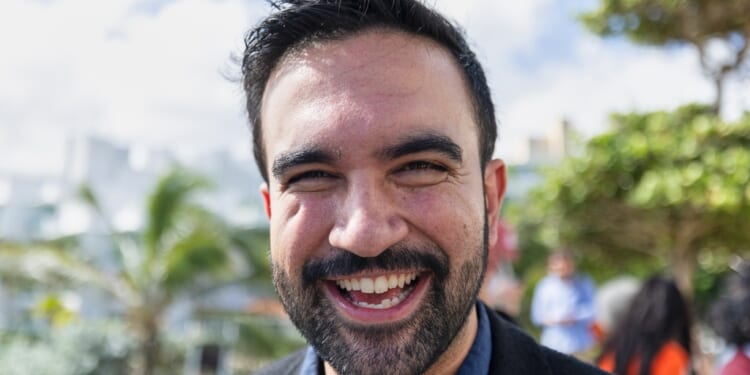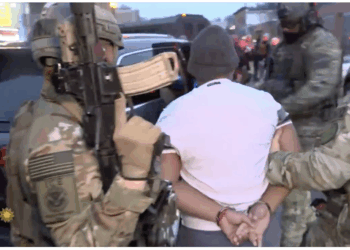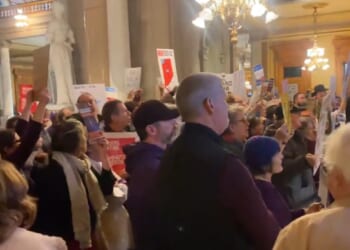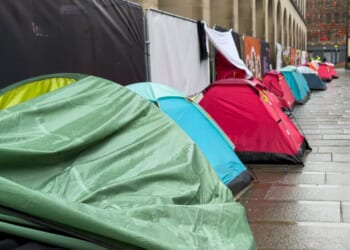In Focus delivers deeper coverage of the political, cultural, and ideological issues shaping America. Published daily by senior writers and experts, these in-depth pieces go beyond the headlines to give readers the full picture. You can find our full list of In Focus pieces here.
When Zohran Mamdani’s campaign ad hit social media in the final stretch of his race for New York City mayor, it seemed at first like a parody. Four women beam into the camera, one after another, greeting each other with an identical line: “Hi, Rabbi!” None of them are rabbis in the traditional sense. No one wears religious garb. What they share is a politics, a certain brand of progressive Jewish identity that confuses moral certainty with moral authority.
And one of the “women” isn’t even a woman at all. The group includes Abby Stein, a transgender activist and outspoken anti-Israel campaigner who was once ejected from the Trump White House after interrupting an event. Stein, like former progressive education activist Naftuli Moster, grew up in the Hasidic world of Borough Park. But where Moster’s journey led him toward a renewed respect for tradition and the excesses of the Left, Stein’s led toward the progressive faith that now dominates New York’s Jewish political establishment.
The ad was meant to be charming: a showcase of “Jewish faith leaders” standing with a candidate who once called Zionism a “racist ideology.” Instead, it became a small cultural Rorschach test. For many observant Jews, it captured everything wrong with the city’s progressive Jewish establishment, a secular priesthood that portrays Judaism as a virtue signal while pouring money and manpower behind politicians hostile to Jews who actually keep the faith.
ANTI-ISRAEL SOCIALIST CANDIDATES TRY TO RIDE MAMDANI’S WAVE TO POLITICAL OFFICE
Groups such as Jews for Racial and Economic Justice, T’ruah, and IfNotNow have turned this act into an art form. Their leaders speak fluent intersectional jargon, using terms like “liberation,” “decolonization,” and “solidarity,” but their operations run like any well-funded political machine. They draw from the same constellation of left-wing foundations, municipal “cultural inclusion” grants, and donor networks that funnel millions into progressive campaigns each cycle.
These organizations wield Judaism as branding. They lend moral cover to the city’s leftmost candidates, often those who support BDS, demonize Israel, and target Orthodox communities as political punching bags. Their true influence lies not in synagogue pews but in Slack channels and activist coalitions, where they anoint those who speak “for the Jews.”
Several years ago, during a previous election cycle, JFREJ launched a 501(c)(4) organization, “The Jewish Vote,” specifically for this purpose. It’s a closed loop: activists support progressive politicians, who then reciprocate with grants and increased visibility. Together they form what can only be described as “the NGO-industrial complex of Jewish guilt.” That complex has been remarkably effective at turning Jewish communal infrastructure into an engine of progressive power, and at marginalizing those whom they claim to represent.
Few people know that dynamic better than Naftuli Moster, a man who once stood at its center. Raised in a Hasidic family in Borough Park, Moster founded Young Advocates for Fair Education, YAFFED, to push for better secular education in New York’s ultra-Orthodox yeshivas. In its early days, YAFFED was a darling of the progressive press. The New York Times and Washington Post wrote admiring profiles; secular Jewish philanthropies wrote checks. Moster spoke the language of reform and equality, and the left embraced him as a hero battling religious backwardness.
But over time, something shifted. “I thought I was fighting for education,” he recalls, “but I started realizing the people around me were fighting for something else, against religion itself.”
In a conversation with the Washington Examiner, he describes the slow unease that crept in. The more he worked with progressive allies, the clearer it became that their hostility wasn’t limited to Haredi yeshivas’ lack of secular education. “They didn’t just want math and English in schools,” he says. “They wanted to dismantle the whole religious system; the community, the family, the values, everything.”
The breaking point came from an unexpected place: the transgender movement. “I’d been skeptical,” Moster says, “but I kept quiet. Then I realized that the same people telling me my religious upbringing oppressed me were now telling me I had to affirm something I didn’t believe. The dogma was the same, just a new religion.”
At first, though, dissent didn’t bring exile. “When I raised concerns quietly,” he explains, “people in my own circles often agreed. They’d whisper that they didn’t really believe a trans woman is literally a woman, but they’d say it’s dangerous to admit that. Everyone was just playing along.”
The shift wasn’t immediate. Early on, Moster noticed small signals, polite distancing, and fewer calls from groups like JFREJ as he began diverging from the party line on issues such as bail reform and gender ideology. Only later, as he spoke more publicly, did the denunciations begin. “That’s when the accusations started — that I was ‘anti-trans,’ that talking about this was dangerous because people could commit suicide,” he says. “It wasn’t disagreement anymore; it was moral condemnation.”
For someone who had once been praised for his courage, the sudden coldness was revealing. “That’s when it hit me,” he says. “It wasn’t about education or equality. It was about control.”
The realization echoed something he’d once seen as the dark side of his own community — the demand for ideological purity, enforced by shame. But he no longer sees the comparison as equal. “In the beginning, I thought both sides were similar kinds of closed worlds,” he says. “Now I see the difference. The Hasidic community, for all its flaws, is trying to preserve something: family, stability, meaning. The far-left world is trying to destroy everything that keeps society grounded.”
That recognition changed how he viewed the people he once fought against. “I started to see the beauty and logic of it,” he says. “They’re holding down the fort. Even if I disagree with aspects of their education system, they’re protecting values the rest of society is throwing away.”
Moster’s disillusionment deepened as he revisited his own work with YAFFED. “I realized they had used me as a battering ram against religious Jews,” he says flatly. “I thought we were allies. They thought I was a weapon.”
He started noticing patterns: the same activists who once amplified his campaigns were now backing candidates who vilified yeshiva parents and smeared Orthodox Jews as leeches on the public purse. The “justice” movement he’d trusted had become, in his words, “a secular crusade against faith.”
When he began speaking quietly with conservatives, people he’d been taught to despise, he found something surprising: curiosity instead of condemnation. “They asked me what I believed,” he says. “The left told me what I had to believe.” It wasn’t a dramatic conversion, but a gradual realization that ideological conformity had replaced honest debate.
Moster’s story isn’t unique. The Left has a knack for radicalizing its own moderates. Its insistence on total conformity drives out those who might have been sympathetic collaborators. Each purge shrinks the circle until only the most zealous remain.
For secular Jewish progressives, that zeal takes a specific form: moral ownership of Judaism itself. Those who keep kosher or oppose BDS are branded “bad Jews,” while activists who campaign against Israel or defend Hamas sympathizers, you know, the “Tikkun Olam” Jews, are feted as prophetic voices. The irony is biblical. The self-described champions of tolerance now cast out their own, wielding “Jewish values” as a cudgel against living Jewish communities.
Moster’s defection exposes the machinery behind this hypocrisy. It’s not a grassroots movement of conscience but a professionalized network of nonprofit organizations, consultants, and donors, an economy built on Jewish identity detached from Jewish belief. The danger lies not only in their political agenda but in their ability to masquerade as the authentic voice of American Judaism while delegitimizing everyone who actually practices it.
Nowhere is that more visible than in New York politics. The same ecosystem that celebrates Mamdani, a man who boycotts Israel, also channels public and private dollars to organizations that sue yeshivas, lobby against synagogue zoning, and campaign to defund security grants for Jewish schools. These groups insist they’re fighting for equality. But equality, in their hands, means erasing distinctions between sacred and secular, between a people and a political program. Their endgame is not inclusion but replacement: progressive ideology as the new religion, its activists as the new rabbinate.
Today, Moster speaks with the calm of someone who has crossed a desert and found water. He hasn’t become a spokesman for Orthodoxy or conservative values, but he has regained respect for the community he once sought to reform. “They’re not perfect,” he says, “but they’re preserving what’s left of a moral order.” He now identifies as Modern Orthodox, a balance between tradition and engagement with the wider world; a position that once seemed impossible to him but now feels like clarity.
He’s learned to recognize fanaticism wearing the mask of liberation. “I used to think the Left wanted to fix the system,” he says. “Now I see they want to destroy it, because faith, any faith, threatens their power.”
It’s a lesson more and more disillusioned progressives are learning, often painfully: that the movement preaching empathy can turn ruthless when its moral monopoly is challenged.
ZOHRAN MAMDANI’S UNIMPRESSIVE WIN
Which brings us back to that viral video — four figures, four smiles, and one refrain: “Hi, Rabbi.” One of them, Stein, stands as the embodiment of what that movement has become — a self-anointed clergy of the secular Left. It’s a scene almost too perfect in its symbolism. The self-appointed rabbis of the Left greet each other in a circle of self-affirmation, convinced they embody the future of Judaism. Outside their frame stand the actual believers — invisible, inconvenient, unfashionable.
Naftuli Moster once stood inside that circle. He knows now that true faith doesn’t need validation from politics, and that liberation isn’t found in trading one orthodoxy for another. The ad’s cheery slogan was meant to project unity. Instead, it revealed a movement so hollow it must invent its own clergy. The rest of us would do well to remember: when everyone is a rabbi, no one is.

















